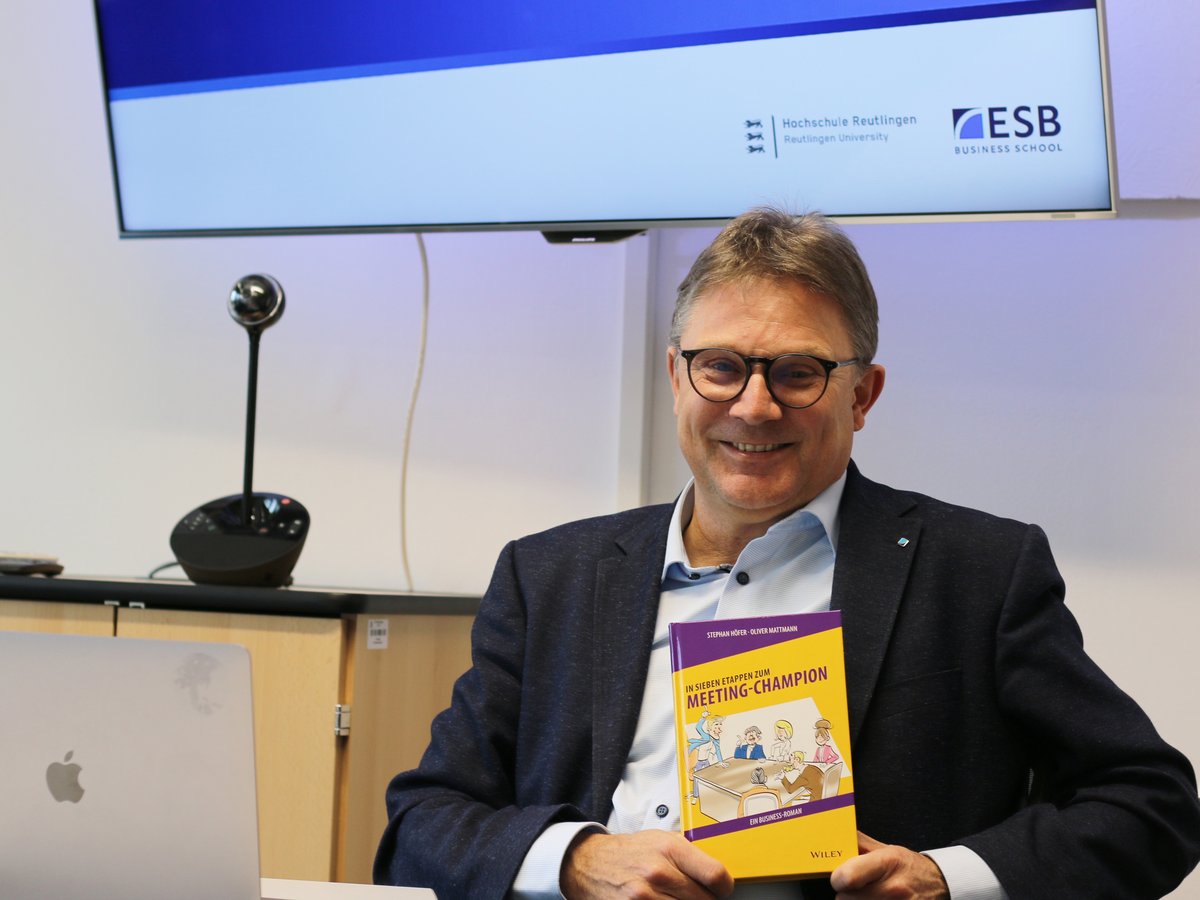21.12.2023
Meeting Refusenik or Meeting Champion?

Meetings may be daily, weekly, monthly, quarterly or special networking events,but they are a common feature of many jobs. Yet productive discussion sometimes develops into a time-wasting, fruitless drudge. This can be avoided, as Professor Stephan Höfer from the ESB Business School along with his co-author Dr Oliver Mattmann describe in their new book ‘In Sieben Etappen zum Meeting-Champion’ (‘Seven Steps to Becoming a Meeting Champion’). The book takes the unusual form of a ‘business novel’. Professor Höfer told us more in an interview.
- So, what is a ‘business novel’, Professor Höfer?
There are more than enough guides on how to hold better meetings. Yet every day we take part in meetings that leave us wondering why we did that. So, unlike the standard non-fiction book, we took a different approach: meetings are organised by people. Therefore, if we want to change the culture of meetings, people have to change and that is an emotional issue. Our book has a story in which we package expert knowledge and facts.
We describe the individuals involved, their background and their beliefs, so that their behaviour and reactions are more comprehensible to readers. Our protagonists behave like colleagues we all know from our daily professional and private lives. By using the first person, the reader is placed in the role of the principle character. This makes it easier to translate the content from the book to your own situation.
- How did the idea for this unusual approach and the book’s theme in general arise?
For a long time, my co-author and I have wanted to write a book about how to improve the culture of meetings, with a special focus on designing change processes. Initially we took the classic approach and planned a structure, compiled the content and began to write.
Then one day I woke up at four in the morning, and sat down at my computer. Instead of writing another chapter of a non-fiction book, it began to turn into the start of a novel, and within four hours I had twenty pages. When we read this text, it was clear to us that this was the right approach to the book.
- Are you yourself a meeting fan or a meeting sceptic?
We need meetings. I am a meeting fan, provided by the end of a meeting my personal contribution was sizeable and good preparation and follow-up ensured the activity-based costs were low.
- The book promises that you can become a meeting champion in 7 steps. Would you reveal one or two of them to us?
Let’s take the first and last steps. The first, because that’s the most difficult, and the last, because it often isn’t on anyone’s radar:
Step 1: How can we avoid needing a meeting at all? Everyone thinks that they really need all the meetings in their diary, that there’s no other way. But at the same time our schedules are already full and - if we are honest about it – not every meeting is actually worthwhile. Before we consider specifically how to hold better meetings, we first of all have to understand the key causes leading us to hold meetings at all. We don’t have to turn every subject into a meeting. The novel suggests ways for dealing with this intelligently.
Step 7: How can we constantly improve our meetings? There’s a German saying, “Kannst du es nicht messen, kannst du es vergessen” – if you can’t measure it, you can forget it. Before the next meeting you need to learn from the previous one, first of all you have to quantify how well the last one actually went. Our novel provides three simply determined parameters including one easy process assessment model. These figures show us how far we are still from the ideal meeting and at the same time offer pointers for how to continually improve.
- What’s the most important thing you must do in connection with meetings?
Be actively aware of the scale of the wastage in our meetings.
- And what’s the most important thing to avoid?
Carrying on as before, just because that’s how we’ve always done it.
- Many people are meeting up with their families at Christmas. Can these ‘family meetings’ be compared with business meetings, and what can we learn from the book about them?
Theoretically this is possible, but seriously I’d advise all readers for once not to try to optimise things and simply to enjoy the holidays – maybe with an interesting business novel about optimising meetings!





